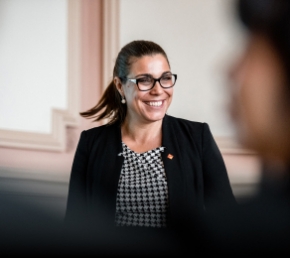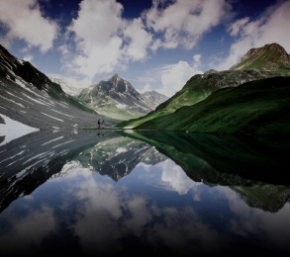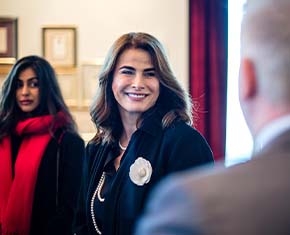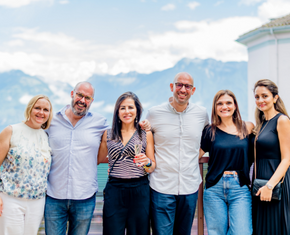- About
- Schools
- Lifelong Education
- News & Events
- Community
#Industry News
Catalyzing Climate Action
How tourism can effect positive change in combination with UN NetZero Facility and Re-Planet Capital Fund Ecosystem
In a landmark event at the United Nations in Geneva, students from Swiss Hotel Management School (SHMS) had the unique opportunity to participate in the launch of the UN NetZero Facility and Re-PLANET Capital Fund Ecosystem.
Tourism has a major impact on the environment and therefore also incredible potential for change and it is for this reason that this summit meeting is an initiative of the United Nations World Tourism Organization (UNWTO). The subject is, therefore, extremely relevant for SHMS students who will be launching their careers the tourism and hospitality sector.
This summit meeting, graced by illustrious key speakers, including Mr. Zurab Pololikashvili, the UNWTO Secretary-General, who underscored the importance of youth in his opening address regarding the pressing issue of climate change. Mr. Pololikashvili's words resonated with the students as he emphasized their pivotal role in shaping the future and driving positive change.
Everyone is asking how to change the planet, and, in my opinion, students are the future. The future is with the new generation. We are investing a lot our students. Unfortunately, they must learn from our mistakes.
Concept of the summit
The global challenge of climate change remains a formidable obstacle, requiring a profound socio-economic transformation. The United Nations World Tourism Organization (UNWTO) is taking a leadership role in promoting climate action in tourism. At COP25, there was a call to embrace a low carbon pathway for tourism with awareness and optimization as key components. The One Planet Sustainable Tourism Programme was created to promote sustainable tourism globally, but its implementation has proven challenging. More cooperation among international organizations and governments is needed for sustainable and global development. This is how we have arrived at the Net Zero facility conference today. The 2015 Paris Agreement set ambitious goals for climate action, to achieve objectives by 2030-50, a new global finance governance model is necessary, one that leverages various stakeholders to unlock the value of carbon, particularly Blue Carbon (oceans), and promotes circular, sustainable, and profitable business models.
The Re-Planet Capital Fund Ecosystem, developed in collaboration between UNWTO and NOAH Regen, presents an innovative financial framework dedicated to catalyzing climate action. It aims to bridge the gap between ecological necessity and profitable business endeavors.
As Mrs. Zoritsa Urosevic, UNWTO Executive Director Introduction to the UN NetZero Facility and Re-PLANET Capital Fund Ecosystem said in her words of welcome,
“To meet the Paris Agreement scaling up financially is crucial for having an impact globally. The WTO called for a co-creation platform with the aim to advance the UN effort. Cooperation is a crucial aspect.”
Ms. Tatiana Valovaya, UNOG Director-General (TBC), underscored this reality and explained why the UN feels their involvement is crucial.
“2023 has been the hottest in history. The current rate of fossil fuels is unsustainable. The 1.5-degree limit from the Paris agreement is still within our reach. But it will take a concerted global effort. The focus of the UN is equality in human well-being and today we must consider the interconnectedness between human well-being and health of the planet and how to mutually sustain both.”
Mr. Zurab Pololikashvili, UNWTO Secretary-General emphasised,
Like wine, it takes time. We need to invest now to keep up with growth. Tourism has rebounded very fast. Planes are full; hotels are full. Tourism is on par with 2008, our best tourism year despite price increases of 30%.
Addressing Global Climate Challenges
According to Mr. Frédéric Degret – Founder and CEO NOAH ReGen Group and Special Advisor to the UNWTO Secretary-General, the addressing global change faces hurdles of scale, the needs and solutions are three-fold:
- Financiers have trillions to invest. But they need a concrete business model with big pipeline projects. Trillions of euros don't get invested in 100k or 200K increments across mini-projects, and massive action needs massive funding.
- Politicians needed holistic toolkits to help them reach their constituents. They need guidance on best practices and a data system for transparency of funds and projects.
- Climate Experts & Scientists have cohesive, defining environmental projects but need access to funding and implementation support.
2017 in Marbella saw financial representatives, politicians, and scientific experts come together to discuss how to make a global impact on improving the ecology and reversing human damage. These discussions in 2017 set the ‘DNA’ of a new model we propose today.
A blended finance model for large scale global financing.
Mr. Paul Walentynowicz, Head of Re-Planet Capital Fundraising Coordination introduced the Re-Planet economic system.
"The level of disruption the human race has created on our planet is immeasurable. We have record heat, record droughts, rivers dying, our oceans dying, huge floods, a record low of Antarctic Sea ice, and wildfires all over the world. The change is reversible, but we have just a few years to get there and how much will it cost? We can do it If we restore our most significant carbon sink - our ocean, plus restore rainforests, manage agriculture. It’s possible but we will need massive global funding and cooperation to initiate this change in the next few years. We must unlock each country's potential. And this is how we will do it."
- Blended Financial Ecosystem: A combination of diverse funding sources, including grants, philanthropic donations, private, and institutional investments and eventual ESG investment, supported by local governments to provide a solid economic foundation.
- Blockchain Technology: Utilizing energy-efficient blockchain technology ensures transparent fund raising and transfer for climate projects with real-time tracking and accountability benefit.
- Transparency and Accountability: Addressing critical gaps in the carbon-credit market through unmatched transparency, accountability, and auditability. Funds are tracked from inception to implementation.
The Re-Planet Capital Fund Ecosystem focuses on addressing capital-intensive climate issues that have historically struggled to secure financing. These include carbon credit quality and integrity, regulatory and market dynamics, and monetizing nature-based and carbon credits.
Mrs. Zoritsa Urosevic, Executive Director of UNWTO said in plain terms,
No one will enter the ecological market if there is no room for profit. We need an integrated model for more green jobs, more livelihood.
Leveraging the Funds
The global renewable energy market, projected to reach €1.5 trillion by 2025, offers significant opportunities. Areas such as energy-efficient technologies, circular economies, and sustainable agriculture show promise.
The UN NetZero Facility offers advisory services to accelerate global progress toward net-zero carbon emissions. Funding for the facility is sourced from various channels, including a portion of the Re-Planet Capital Fund (2%), future climate taxes, and voluntary contributions– a large portion of which comes from the tourism industry.
According to Mrs. Zoritsa Urosevic, Executive Director of UNWTO,
Tourism is 4.2 percent of GDP (Gross Domestic Product) and comprises 1 of every 10 jobs
The travel and tourism sector is responsible for 8-10% of global CO2 emissions, with a significant portion coming from travel to and from destinations, particularly on longer routes. Unfortunately, there is a real lack of transparency and understanding of the carbon credit economy. This is one of the primary reasons people choose not to participate in contributing to carbon offsetting. The UN NetZero Facility will help alleviate that problem b offering tourism and other industries a window. You will be able to see where your money goes.
Clarifying and coordinating the Carbon Economy
There are initiatives around the world that aim to; conserve marine ecosystems, address rising sea levels and extreme weather events, promote circular business models, develop sustainable supply chains, assist nations in implementing nature-based solutions, create sustainable jobs, empower communities, preserve biodiversity and cultural heritage, and invest in renewable technologies. Most signatories on these projects are companies, they see the potential for economic growth in the new industry model.
Until now the Carbon Economy has been convoluted. These organizations aim to clarify, leverage, and exponentially expand the carbon economy. One primary way to do this is transparency.
Making a difference
Much of the funding will still be reliant on individual contributions. But with clear promotion and communication, even if even only one percent of tourists and companies are agreeable to voluntary contributions, we will still have 20-30 million contributors.
As Mr. Frédéric Degret said, “if we promote voluntary contributions, say one dollar per traveler on airlines, that equals 4.5 billion dollars per year to invest. Re-Planet, in combination with other investment funds, has the capacity to scale that 4.5 billion up five-fold. Then we then have to ability to talk to governments and bring large scale funding to projects”
On a positive environmental note, in some destinations, tourism can contribute to higher water quality, better protection of nature, and investment in environmental infrastructure and services. This presents an opportunity to transform the image of tourism and contribute to a sustainable and resilient future for the sector and the planet.
Our Commitment
This conference underscored the impact tourism can have, both positive and negative, in environmental and sustainability issues. At SEG we embrace our responsibility in training the future leaders of the tourism industry to develop solutions for the future. We take pride in the faculty of our schools who cultivate innovation and sustainability in the curriculum, the campus, and the students. They have made it their mission to incorporate environmental education into all of our schools.
César Ritz Colleges Switzerland is our flagship school when it comes to sustainability as they have made it a core focus of their education with many courses in global sustainability issues and hospitality sustainability. They share campuses and facilities with Culinary Arts Academy where sustainability and best-practices are taught and where home grown and locally sourced ingredients are prioritized. Our students at HIM and SHMS study courses in Ethics and Sustainability, Global Issues, Responsible Resort Management, Environmental Science, and Sustainable Events Management.
For the fortunate students from SHMS who had the opportunity to attend this monumental meeting at the UN, they learned first-hand that the responsibility is landing on their shoulders, and that they have a real opportunity to make a difference. We are proud to support them in their journey.
Investing in students who will be the catalyst for change is the key.
Do you want to make a difference too? Does a career in tourism, hospitality, business or culinary arts interest you? Learn about our schools and how you can choose a career that makes a difference.
#Industry News


















